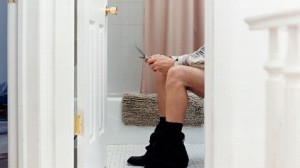It’s no secret I take my computer to the bathroom. Esteemed International Association of Food Protection president Don Schaffner noted as much at last year’s meeting, telling attendees far more than they wanted to know when he said he got a great food safety risk communication distillation from me – while I was on the toilet.
 When Chapman first got a blackberry over 10 years ago, he e-mailed me and proudly proclaimed, “I’m in the bathroom” (but not exactly like that).
When Chapman first got a blackberry over 10 years ago, he e-mailed me and proudly proclaimed, “I’m in the bathroom” (but not exactly like that).
Today’s hipsters call it toilet tweeting.
So when a story from Canada’s version of state-sponsored jazz (CBC) proclaims you should probably stop bringing your phone into the bathroom with you, I have some questions.
The story quotes Anne Bialachowski, manager of infection control at St. Joseph’s Healthcare in Hamilton, Ontario, was testing smartphones and tablets at St. Joseph’s on Monday as part of World Hand Hygiene Day, and found that some devices were more than just grimy.
Using an ATP test, which measures organic material that gets left behind on surfaces, Bialachowski found some phones and tablets had scads of things living on them — that organic material could be anything from fecal matter and E. coli, to the virus that causes the flu.
Until the results are published in something resembling a peer-reviewed journal, they’re not much.

